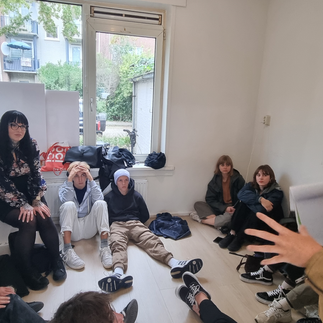Exploring Cultural Diversity and Democratic Engagement: Latvian Student Visit Amsterdam Nieuw-West
- Anna Stolyarova

- Mar 5, 2024
- 4 min read
In the landscape of global education, initiatives like the Erasmus+ programme stand as pillars in fostering inclusivity, celebrating diversity, and nurturing democratic participation. This narrative unveils the enriching voyage of Latvian students as they ventured into Amsterdam Nieuw-West, a vibrant, predominantly Muslim neighborhood, to engage with their peers from Comenius Lyceum. Against the backdrop of Erasmus+'s political priorities—embracing inclusion and diversity, promoting environmental sustainability, enhancing digital education, and encouraging participation in democratic life—the narrative unfolds, illustrating the profound impact of intercultural exchange and democratic engagement in an interconnected world.
The Power of Street Art

Street art, often perceived as mere spray-painting on urban surfaces, embodies a deeper essence that transcends borders and cultural boundaries. It serves as a powerful medium for connecting individuals on multinational and multidisciplinary levels. Within the context of the Latvian students' from Cēsu Jauniešu māja & "Rozulas klubs" visit to Amsterdam Nieuw-West, street art emerged as a unifying force, bridging the diverse backgrounds of the participants.
Regardless of their origins or cultural affiliations, students from Latvia's countryside and those from Dutch Muslim backgrounds living in urban arrea found common ground through their shared enthusiasm for artistic expression. Through collaborative engagement in the Urban Art Workshop, they discovered the transformative potential of street art as a catalyst for cross-cultural dialogue and understanding. Beyond its aesthetic appeal, street art served as a platform for forging meaningful connections and fostering a sense of unity amidst diversity. As spray cans met canvases, barriers dissolved, and bonds were forged, illustrating the profound capacity of street art to connect people across borders and ideologies.
Moreover, the teachers of Comenius Lyceum organised a special tour in the form of a treasure hunt through the center of Amsterdam, intertwining street art and philosophy. This innovative approach guided students from both Latvia and the Netherlands on a journey through the history of Amsterdam philosophers and their monuments, adding a philosophical dimension to their exploration of the city's streets. As they uncovered hidden gems and engaged in philosophical discussions inspired by the city's rich intellectual heritage, students deepened their understanding of cultural diversity and historical significance, further enhancing their intercultural experience. Through this multidisciplinary approach, the treasure hunt not only enriched their knowledge but also fostered critical thinking and introspection, reinforcing the transformative power of education in fostering inclusive and interconnected communities.

Encounter in Amsterdam Nieuw-West: With a palpable sense of anticipation, Latvian students embarked on their journey to Amsterdam Nieuw-West. Stepping into the neighborhood, they were greeted by the lively atmosphere, characterized by its rich cultural tapestry and bustling streets. Warm hospitality awaited them from their Dutch counterparts at Comenius Lyceum. Against a backdrop of diverse architectural landscapes and the soul-stirring call to prayer echoing through the streets, the exchange of cultural perspectives commenced.
Interactions with Local Students: Amidst the picturesque setting, Latvian students immersed themselves in profound dialogues with local peers, transcending linguistic and cultural barriers. Through candid conversations and shared experiences, they delved into the intricacies of daily life in Amsterdam Nieuw-West, gaining insight into the challenges and triumphs of its multicultural inhabitants. Discussions ranged from traditional cuisines to reflections on religious practices, fostering mutual understanding and appreciation for cultural diversity.
Exploration of Democratic Participation: Central to the visit was the exploration of democratic participation within a multicultural society. Engaging in collaborative activities and workshops, students delved into the mechanisms of civic engagement and community empowerment. From participatory decision-making processes to grassroots initiatives promoting social cohesion, they witnessed firsthand the transformative potential of active citizenship in nurturing inclusive and resilient communities.
Reflections and Future Implications: As the visit concluded, Latvian students departed Amsterdam Nieuw-West with a newfound appreciation for global citizenship and the importance of embracing diversity. Reflecting on their experiences, they recognized education as a catalyst for social change and democratic renewal. Inspired by the resilience and solidarity witnessed in the neighborhood, they returned to Latvia with a renewed commitment to promoting inclusion, environmental sustainability, and democratic values within their communities.
The visit epitomizes the ethos of the Erasmus+ programme, embodying its overarching political priorities. Through intercultural exchange and democratic engagement, students embarked on a transformative journey of self-discovery and collective empowerment, laying the groundwork for a more inclusive and interconnected future. Amsterdam Nieuw-West stands as a testament to the potential of education to bridge cultural divides and foster a world where diversity is celebrated and democratic values are upheld. Through the implementation of the Youthpass approach in the Youth Exchange, participants from Amsterdam have experienced significant personal growth and development. They have gained a heightened awareness of their learning outcomes from the project, as well as a deeper understanding of the potential benefits of engaging in youth projects.
Moreover, they have acquired clarity regarding the skills and competences they aspire to enhance or acquire in the future. Equipped with improved communication abilities, they are more proficient in articulating their project-related learnings to others, and they demonstrate increased capability in applying these newfound skills and knowledge in their daily lives. Notably, attaining a YouthPass certificate has instilled within them a profound sense of pride and confidence, underscoring the transformative impact of the program on their self-esteem and self-perception.







































